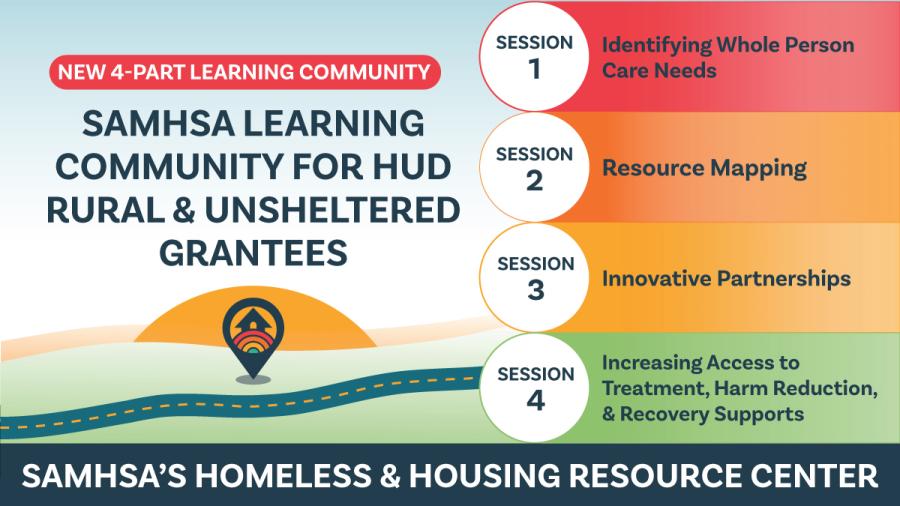In March 2024, the Homeless and Housing Resource Center hosted a learning community series for U.S. Department of Housing and Urban Development Rural and Unsheltered grantees aimed to enhance their understanding of and building cross-system partnerships that address the needs of individuals and families impacted by substance use and/or mental disorders among those experiencing unsheltered homelessness and homelessness in rural areas.
Each session in this four-webinar series provided information, insights, and strategies to address the multifaceted challenges faced by individuals experiencing homelessness, particularly those with substance use disorders and/or mental health conditions. This post summarizes key lessons from each learning community session, providing insight into the practices, partnerships, and resources discussed. For detailed insights, access the webinar recordings and slides, which are linked in the heading of each session.
Session 1: Emphasizing Whole-Person Care and Core Values
The session focused on the importance of whole-person care—a holistic approach encompassing physical, emotional, behavioral, social, spiritual, and financial well-being. Presenters underscored the necessity of centering work around foundational core values such as compassion, empathy, housing as a human right, and the principle that everyone is capable of recovery with the right supports. The session highlighted how stigma can hinder people from accessing care and discussed strategies to overcome it and promote treatment. They also highlighted the value of incorporating data from individuals with lived expertise into the assessment process to ensure services are designed to meet the actual needs of those they serve.
Session 2: Resource Mapping for Enhanced Partnerships and Coordination
The second session discussed the critical role of resource mapping as a tool to maximize partnerships and coordinate services. Resource mapping involves identifying and leveraging available resources and funding streams to build a comprehensive approach to care that addresses the needs of the whole person. Attendees learned how to use a crosswalking tool to map out services, providers, funding sources, and target populations, aiding in the identification of gaps and opportunities for collaboration among healthcare agencies, human service organizations, and community partners.
Session 3: Innovative Practices and Partnerships
The third session showcased RecoveryWorks Colorado and Aspire Indiana’s models of innovative practices and partnerships to support individuals with substance use disorders and mental health conditions. Presenters shared their experiences and strategies in establishing effective partnerships, delivering whole-health recovery continuum services, and achieving notable success rates in their programs. The session emphasized the potential of relationships, service, mission, and vision in creating impactful community-based solutions.
Session 4: Expanding Access to Recovery Supports, Treatment, and Harm Reduction
The final session reviewed strategies to increase access to recovery supports, addiction treatment, and harm-reduction services. It addressed the disparate impacts of substance use, the challenges posed by stigma, and the necessity of adopting a no-wrong-door/multiple pathways approach to recovery. Presenters discussed the roles of peer providers, recovery community organizations, and the importance of expanding harm-reduction strategies beyond traditional methods to meet community needs effectively. The session also introduced practical steps for overcoming barriers to addiction treatment and harm reduction service expansion, and highlighted Smoke Work’s safer smoking initiatives.
Conclusion
This learning community provided a comprehensive overview of best practices, innovative strategies, and collaborative efforts that homelessness service providers can employ to support people experiencing homelessness who have a mental health condition and/or substance use disorder. For further details and to access a wealth of resources, we encourage you to visit the Homeless and Housing Resource Center website to review the webinar recordings and slides.
This blog post was developed with the assistance of generative artificial intelligence.


